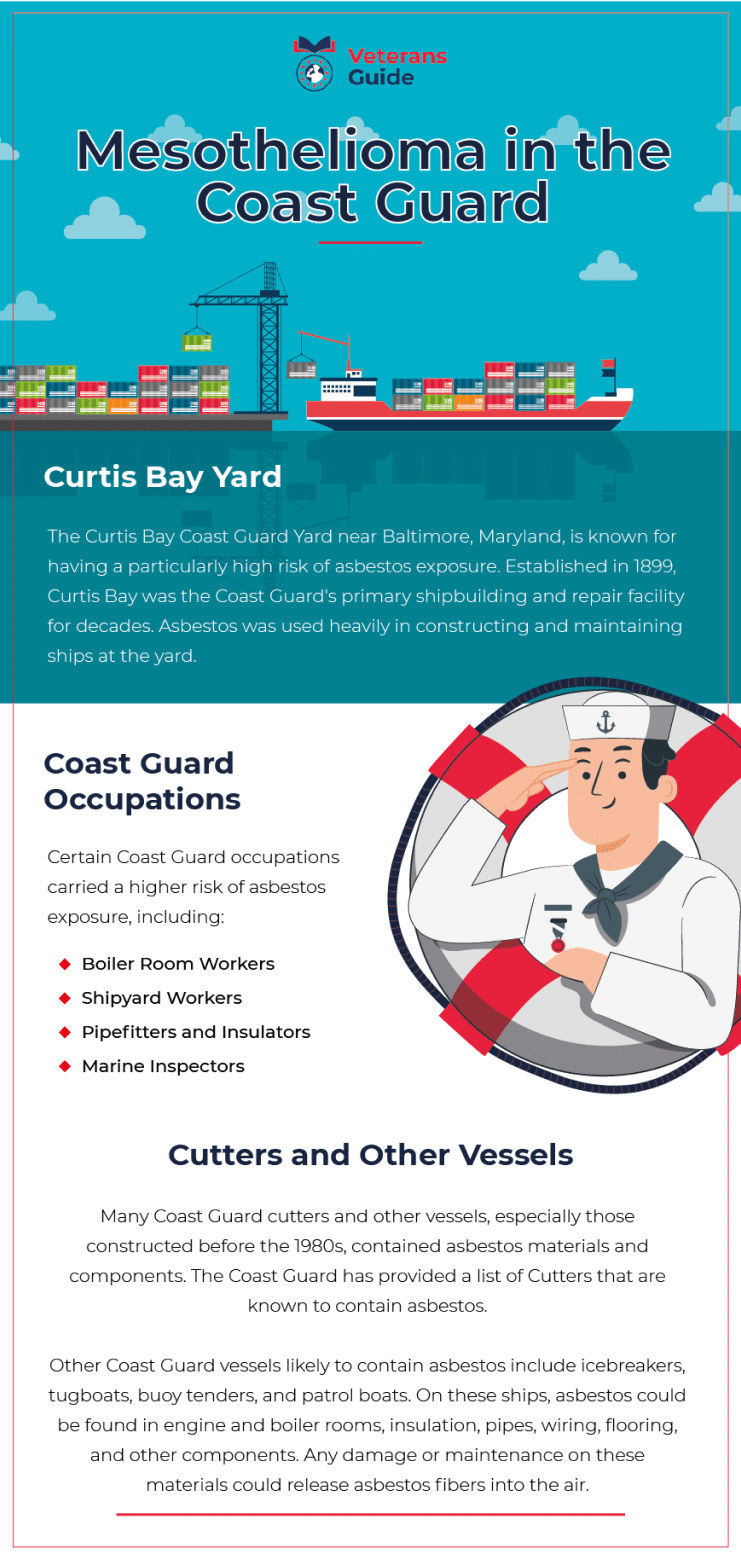Mesothelioma in the Coast Guard
Mesothelioma is a devastating cancer caused by asbestos exposure. Asbestos was commonly used in U.S. Coast Guard ships and bases for many years. Coast Guard veterans who develop mesothelioma—even decades after their service—may be eligible for VA benefits and other compensation. Veterans Guide explains the risk of mesothelioma in the Coast Guard and how to get help if you or a loved one is a veteran affected by the disease.
Although asbestos is now recognized as a dangerous carcinogen, it was widely used in the Coast Guard and other military branches for much of the 20th century. Many Coast Guard ships, buildings, and equipment contained asbestos materials, putting veterans at risk of inhaling harmful fibers and developing mesothelioma later in life. If you have been diagnosed with mesothelioma that you suspect is connected to asbestos exposure during service in the Coast Guard, you may be eligible for benefits and compensation.
Asbestos Exposure in the Coast Guard
Mesothelioma is an aggressive cancer that develops in the lining of the lungs, chest, abdomen, or heart. Inhaling or ingesting asbestos fibers is the only known cause of the disease. These microscopic fibers can cause inflammation and scarring that may lead to malignant tumors 20 to 50 years after exposure. Unfortunately, mesothelioma is often advanced and difficult to treat by the time symptoms appear.
The Coast Guard used asbestos extensively in ships, aircraft, vehicles, and shore facilities. Asbestos was prized for its heat resistance, insulating properties, and affordability, so it was used in many materials, including insulation, gaskets, pipes, flooring, and wiring.
From the 1930s until the early 1980s
Curtis Bay Yard
The Curtis Bay Coast Guard Yard near Baltimore, Maryland, is known for having a particularly high risk of asbestos exposure. Established in 1899, Curtis Bay was the Coast Guard’s primary shipbuilding and repair facility for decades. Asbestos was used heavily in constructing and maintaining ships at the yard.
In addition to shipyard workers, Coast Guard personnel serving on ships repaired at Curtis Bay were also at risk of asbestos exposure. In 2008, the EPA designated some areas of the Curtis Bay Yard a Superfund site due to asbestos contamination and other hazardous substances.

Coast Guard Occupations
Certain Coast Guard occupations carried a higher risk of asbestos exposure, including:
- Boiler room workers: Asbestos insulation was used extensively in and around ship boilers.
- Shipyard workers: Builders and maintenance workers at Coast Guard shipyards like Curtis Bay faced constant exposure.
- Pipefitters and insulators: These tradesmen regularly handled asbestos materials on ships and in-shore facilities.
- Marine inspectors: A study found Coast Guard marine inspectors had a significantly elevated risk of mesothelioma, likely from exposure during ship inspections.
Cutters and Other Vessels
Many Coast Guard cutters and other vessels, especially those constructed before the 1980s, contained asbestos materials and components. The Coast Guard has provided a list of Cutters that are known to contain asbestos.
Other Coast Guard vessels likely to contain asbestos include icebreakers, tugboats, buoy tenders, and patrol boats. On these ships, asbestos could be found in engine and boiler rooms, insulation, pipes, wiring, flooring, and other components. Any damage or maintenance on these materials could release asbestos fibers into the air.
Secondary Asbestos Exposure in the Coast Guard
In addition to veterans directly exposed during their Coast Guard service, their family members have also been put at risk of secondary asbestos exposure. Such exposure occurs when a veteran unknowingly brings asbestos fibers home on their clothing, skin, or hair. Family members who laundered contaminated uniforms and those who came in contact with the veteran could inhale these fibers.
While less common than direct occupational exposure, secondary asbestos exposure has been linked to many mesothelioma cases among military families. Coast Guard veterans diagnosed with mesothelioma should have their spouses and children evaluated for potential asbestos-related health issues.
Exposed to Asbestos in the Military?


Benefits for Coast Guard Veterans With Mesothelioma
Coast Guard veterans diagnosed with mesothelioma caused by military asbestos exposure are eligible for benefits from several VA programs.
VA Disability
The VA deems mesothelioma 100 percent disabling, making veterans eligible for maximum disability compensation. The 2024 VA disability rate for a single veteran with mesothelioma is $3,737.85 per month. Higher rates are available for veterans with dependents.
To qualify for benefits, veterans must have a mesothelioma diagnosis and proof that their cancer resulted from asbestos exposure during their Coast Guard service. Service records showing their job duties and work locations can help support a VA claim.
In addition to monthly compensation, a 100 percent disability rating provides other benefits, including priority VA health care enrollment, home and vehicle adaptation grants, and educational and employment services.
VA Pension
Low-income Coast Guard veterans with mesothelioma who served during wartime may be eligible for a VA pension to supplement their income. Pension eligibility requires the veteran to have limited income and assets and be at least 65 or permanently disabled.
Aid and Attendance
Coast Guard veterans with mesothelioma who need help with daily living activities may qualify for an additional Aid and Attendance allowance on top of their pension or disability compensation. This benefit can help pay for in-home care, assisted living, or nursing home care related to mesothelioma or other disabilities.
Mesothelioma Compensation for Coast Guard Veterans
In addition to VA benefits, Coast Guard veterans may be able to pursue legal compensation from the companies that made the asbestos products used in the Coast Guard.
Coast Guard Mesothelioma Lawsuit
Veterans cannot sue the government or Coast Guard directly but can file lawsuits against the manufacturers of the asbestos-containing products they were exposed to during their service. Many companies that supplied the military with asbestos materials have faced lawsuits, including Johns Manville, W.R. Grace, Owens Corning, and Raybestos-Manhattan.
A mesothelioma lawsuit can provide compensation for medical expenses, lost income, pain and suffering, and other damages. Surviving family members can also file wrongful death claims if a Coast Guard veteran passes away from mesothelioma.
Settlement Amounts of Coast Guard Mesothelioma Lawsuits
Most mesothelioma lawsuits result in out-of-court settlements rather than going to trial. The average settlement is around $1 million, with some reaching multimillion-dollar amounts. Factors that affect settlement value include the veteran’s diagnosis and prognosis, the number of companies sued, and the strength of evidence linking the illness to Coast Guard asbestos exposure.
An experienced mesothelioma attorney can evaluate your case and negotiate with the defendants for a fair settlement. They can also advise you on other potential sources of compensation, like asbestos trust fund claims.
Asbestos Trust Fund Claims for Coast Guard Veterans
Some asbestos companies have gone bankrupt due to the high number of mesothelioma lawsuits filed against them. As part of their bankruptcy reorganization process, courts required these companies to establish trust funds to compensate current and future asbestos victims. These trust funds are designed to pay out claims to individuals diagnosed with mesothelioma and other asbestos-related diseases, even after the companies are no longer operating.
Coast Guard veterans with mesothelioma can file claims against one or more of these asbestos trust funds, either in addition to or instead of filing a traditional lawsuit. To be eligible for compensation from a trust fund, veterans must provide evidence of their diagnoses and exposure to the bankrupt companies’ products.
Filing an asbestos trust fund claim is generally faster than pursuing a lawsuit, as claims proceed through an administrative process rather than litigation. This process can reduce the time and legal expenses involved. Additionally, veterans who meet the eligibility criteria are guaranteed to receive some level of compensation from the trust funds.
Contact Veterans Guide and Hire a Mesothelioma Lawyer
If you or someone you love has developed mesothelioma from asbestos exposure during service in the Coast Guard, contact Veterans Guide for help. We can assist you with obtaining VA benefits and connect you with an experienced mesothelioma lawyer.


